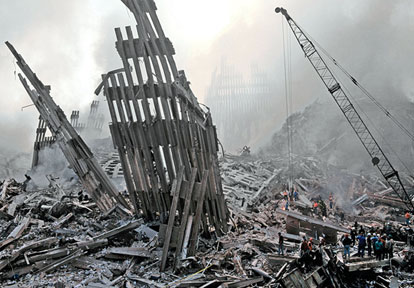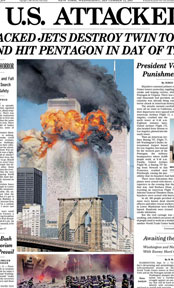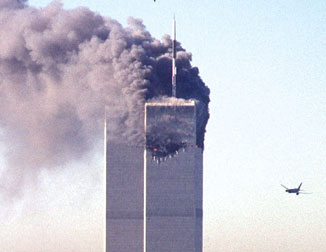Nine years after 9/11
By Pramod DE SILVA
 |
|
Ground Zero |
Terrorism takes many forms, but at its core, the goal is nearly
always the same. Terrorism subverts our liberties, our values and our
way of life. We in Sri Lanka have experienced the worst atrocities that
can be committed by terrorists in the name of 'liberation'. Terrorists
often claim to be fighting for freedom, but that is the very thing that
they take away.
What exactly is terrorism? There is no single accepted definition of
terrorism. There are more than 100 definitions of the word, the first
use of which was recorded in 1795 in the London Times. The US Federal
Bureau of Investigations defines terrorism as "the unlawful use of force
or violence against persons or property to intimidate or coerce a
government, the civilian population, or any segment thereof, in
furtherance of political or social objectives".
As the reference to 1795 shows, terrorism is not altogether a new
phenomenon. But the world lacked a collective will to fight terrorism in
all its manifestations until nine years ago, when, in one defining
moment, it became clear that it must be fought firmly and decisively.
That moment is forever etched in history - and our minds.
More than 3,000 people perished when 19 terrorists crashed airliners
into the World Trade Center Twin Towers in New York bringing both towers
down and into the Pentagon on September 11, 2001. A fourth airliner, now
famously known as United 93, crashed after passengers overpowered the
hijackers and thwarted their plan, apparently to attack the White House.
That was (and remains) the single biggest act of terrorism on US soil
and even worldwide, it is one of the biggest attacks ever. It spurred a
chain of events, some good, some bad, but the overall effect was a
heightened awareness that terrorism everywhere should be crushed.
Just one month earlier, in July 2001, the Liberation Tigers of Tamil
Eelam (LTTE) had staged an attack on the country's only international
airport. Not many countries listened to Lanka's woes then, other than a
cursory condemnation of the attack. But 9/11 changed all that!
Terrorists were exposed for what they are: bloodthirsty criminals
masquerading as ideological or freedom fighters. Thus, the events of
9/11, though happening on the other side of the world, had an immediacy
that we could easily identify with. When many New Yorkers experienced
terror for the first time, we knew how they felt: We had been there.
 |
|
New York Times front
page on September 12, 2001 |
The immediate reaction of the US after 9/11 was to declare a 'War on
Terror'. Though this was aimed mainly at al-Qaeda, it gave an impetus to
campaigns by other countries to crush terrorism. Sri Lanka was one of
the beneficiaries of this approach, as many countries which previously
turned a blind eye to the activities of the LTTE on their soil began to
tighten the noose around that organisation. It also became evident that
terrorist groups learn from and collaborate with, each other. The events
of 9/11 propelled the world to cooperate with regard to fighting
terrorism within and beyond their borders. Suddenly, terrorism in one
country could not be treated as an isolated chain of events. The world
community realised that all countries could be affected and the UN
passed several resolutions to contain acts of terrorism.
Renewed vigour
With just one year to go for the 10th anniversary of the 9/11 attack,
there is renewed vigour to pursue terrorists all over the globe. In the
meantime, Sri Lanka has become the only country to actually defeat a
terrorist group described by the FBI as the 'worst in the world', even
ahead of 9/11 perpetrators al-Qaeda. The defeat of the LTTE in May 2009
marked a watershed in anti-terror operations and many countries are keen
to learn from the Sri Lankan experience.
But the world has still not come to terms with some of the issues
that arose from 9/11. Nowhere is this more visible than in the current
debate about Islam and al-Qaeda. The US was grappling with several
controversial issues as the anniversary loomed, including the plan to
build a Muslim religious centre near Ground Zero, the site of the WTC
and the plan by a little-known church in Florida to burn copies of the
Holy Koran on September 11.
By attempting to prevent the construction of the religious centre or
by going ahead with a Koran burning, they are doing just what the
terrorists want - foment religious discord and dissension. This is a
time to act prudently without giving into emotions. Indeed, many harsh
decisions were made in the years following 9/11, including the
situations that developed in Iraq and Afghanistan. These theatres have
now become breeding grounds for terrorists who respect no borders and
who have been responsible for some of the worst post-9/11 attacks.
Justifiably, September 11 saw an intensification of the battle
against al-Qaeda and its chief Osama bin Laden, who remains elusive.
Unfortunately, thousands of civilians have died in Iraq, Afghanistan and
Pakistan in attacks that were primarily aimed at terrorists. Despite a
worldwide effort to crack down on terror, there had been many tragedies
that could have been prevented if more intelligence was available. The
July 5, 2005 attacks in London, the Madrid train bombings and 26/11
Mumbai attacks are just a few of them.
No matter what happens, it is important not to give in to terrorism.
The Americans were resilient following 9/11 and resolved not to let
their nation be haunted by the tragedy, although it was an unspeakable
horror. Sri Lankans too had always stood up to terrorism as one through
countless killings and bombings, which is one reason why the LTTE could
be defeated in the end. Indians, Pakistanis, Afghans, Filipinos and
Indonesians, among others, are showing the world that terrorism cannot
take their freedom away, even if lives can be snuffed out. The world
must help those nations and people’s who have been affected by the scars
of terrorism.
World without terror
This is why it is important to remember 9/11 every year. The ground
where the WTC stood is a site that reminds us that no matter how
gruesome terrorists can become, they cannot hold us to ransom. It is a
site that pays homage not only to the memories of 3,000 people, but also
to the hopes of people the world over for a world without terror. The
site still resonates with the embers of the last moments of life of
those who were on the planes and those in the buildings, even as a new
'Freedom Tower' rises from the ashes. It tells of the courage of fire
fighters and volunteers who risked their lives to save others. It is a
testimony to the determination of New Yorkers - and Americans - to stand
up to terror. Terrorism can destroy lives and buildings, but not the
collective will of a people to fight terror. It is a place worth
visiting, if only to reflect on the futility of terror.
As we close in on 2011, the inevitable fallout of 9/11 has been a
restriction of personal liberties which had been taken for granted. Yes,
these measures can sometimes be humiliating, but they are also
necessary. It might not always be possible to balance security and
liberty concerns while battling terrorism. There were other aberrations
of the War on Terror, exemplified by the horrors of Guantanamo Bay and
Abu Ghraib.
 |
|
The second passenger
plane approaches the towers |
There is also a raging debate as to whether global terrorism can be
defeated in its entirety. One school of thought is that constructive
engagement or negotiations must be the basis for resolving terrorism.
Post 9/11, there are instances where terrorist groups have given up
arms and entered the democratic mainstream. Aceh and Nepal are two
examples. But what if a terrorist group spurns talks and literally
sticks to its guns?
That was the case in Sri Lanka, where several rounds of peace talks
had been held with the LTTE. But it chose to reply with bullets. Sri
Lanka has indeed shown that terrorism can be defeated militarily.
Separatism still seems to be the cause of most terrorist groups, as
it was in the case of the LTTE. But there are other causes espoused
through violent means. Groups such as al-Qaeda, Abu Sayyaf and JI have
distorted religious edicts to wage a 'war' against the West and Western
interests.
Elusive terror groups
It is also difficult to battle elusive terror groups who have no
'territory' so to speak. They cross porous borders with ease and usually
blend into the civilian populations to evade capture. It may not be
possible to launch conventional war tactics against these groups except
for air strikes against possible hideouts, which comes with the
possibility of collateral damage. It is also not quite possible to offer
so-called 'political solutions' to groups which have no 'demands' in the
conventional sense, but only hazy objectives shrouded in religious or
ethnic garb.
Almost all terror groups aspire for some sort of 'liberation' though
it is not always clear who is to be liberated and from whom. But as the
years go by, they usually lose sight of such goals and become the sole
vehicle for fulfilling power-hungry objectives of their leaders, leading
to the suppression of the very communities they are supposed to
'liberate'.
Despite the best efforts of many countries, al-Qaeda and many other
terror groups are still active and pose a threat to humanity. There
should be greater international cooperation to share intelligence and
fight terrorism. Even certain countries which sympathised with, if not
supported, terrorist movements have realised that terrorism has no place
in the modern world. September 11, 2001 had changed the world in more
ways than one. It hardened the attitudes of many governments around the
world towards terrorism. Many saw 'freedom fighters' for what they
really are.
Thus there should be no pauses in the campaign against terrorism. As
the saying goes, "Governments have to be lucky all the time, whereas
terrorists have to be lucky only once." Eternal vigilance is the only
answer. Terrorists must not be allowed to destroy our democratic and
moral values, even if they succeed in destroying our mortal lives. They
must not be allowed to destroy our societies and our future. Nine years
after 9/11, the world must resolve to make terrorism a thing of the
past.
|

